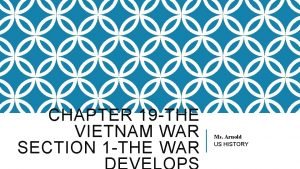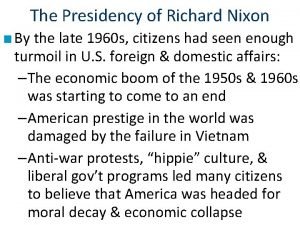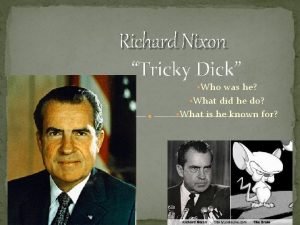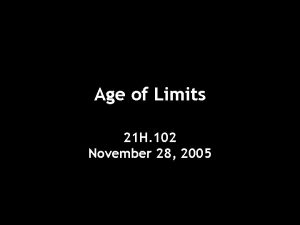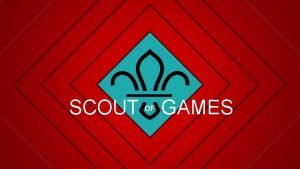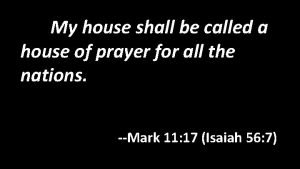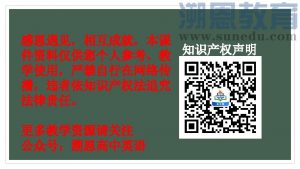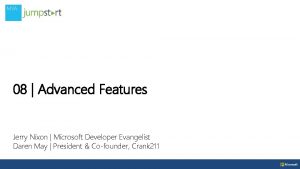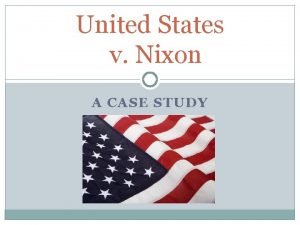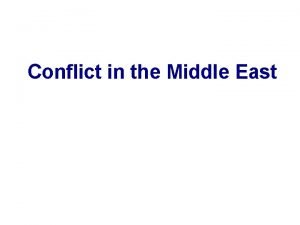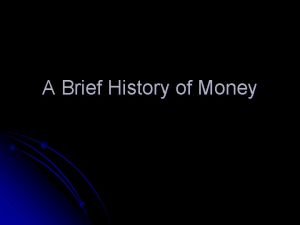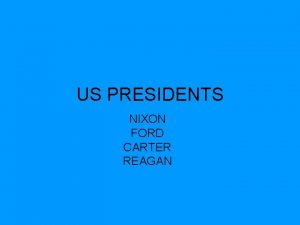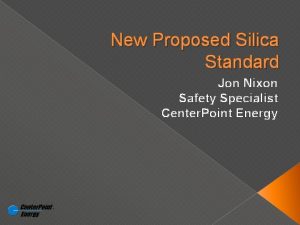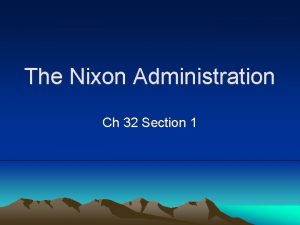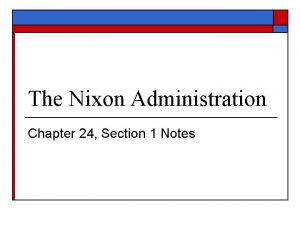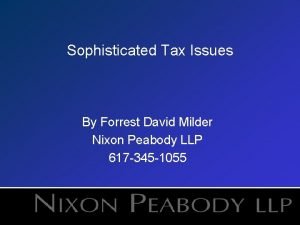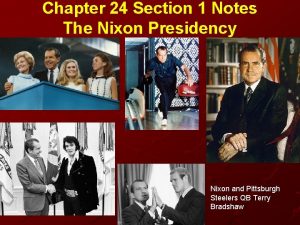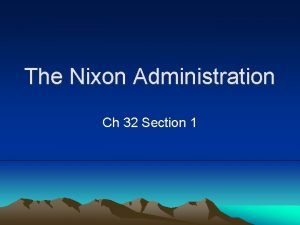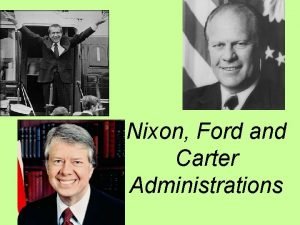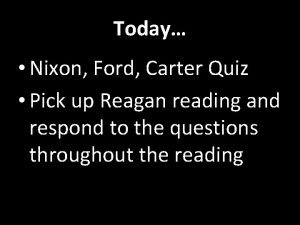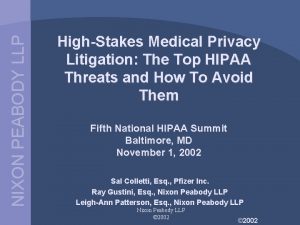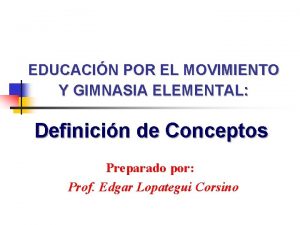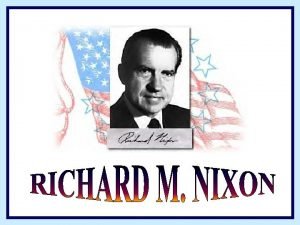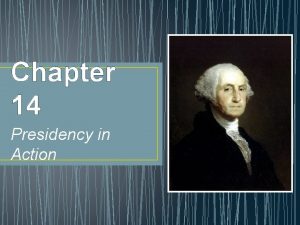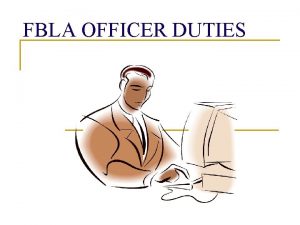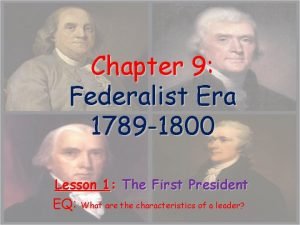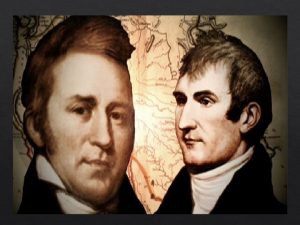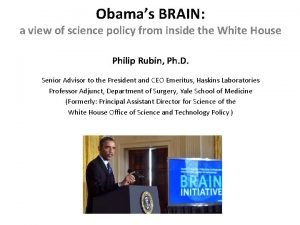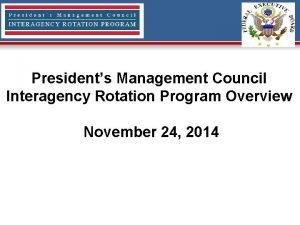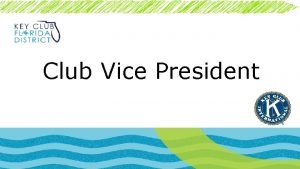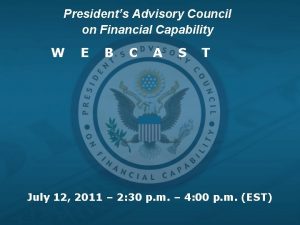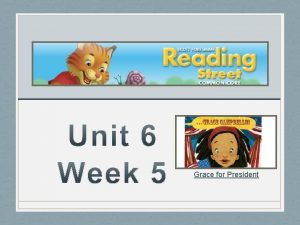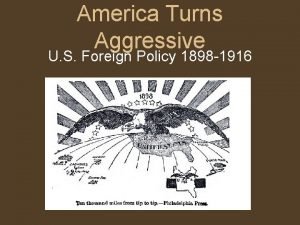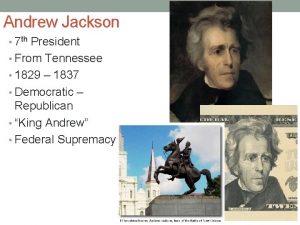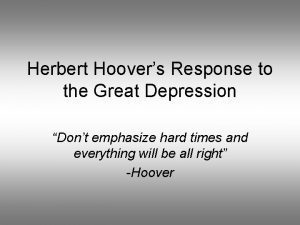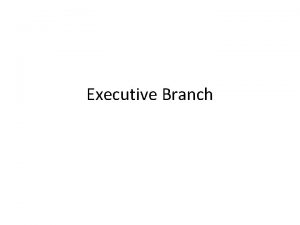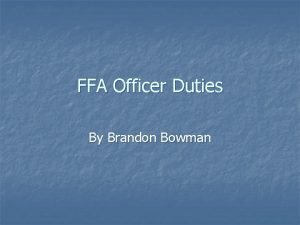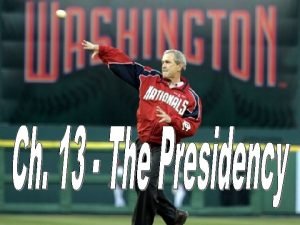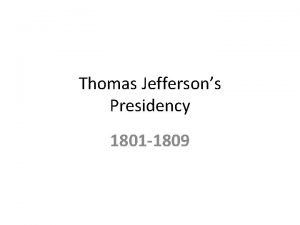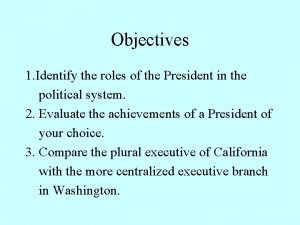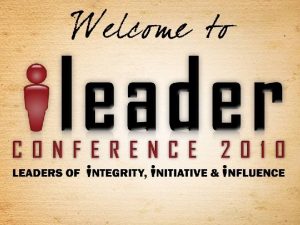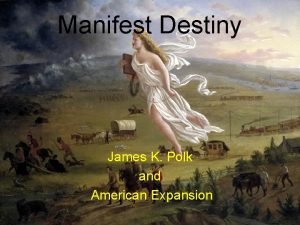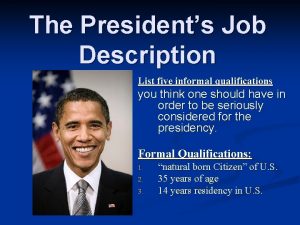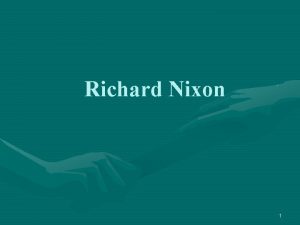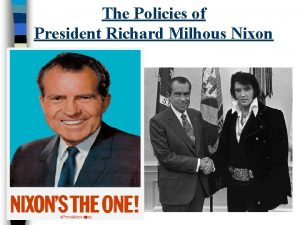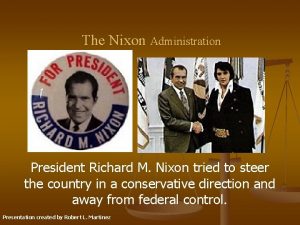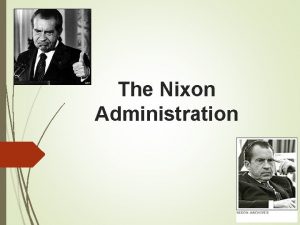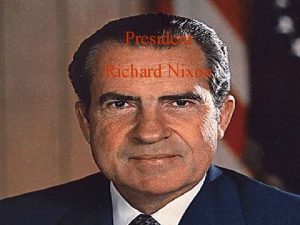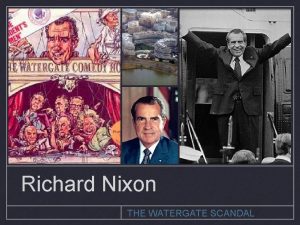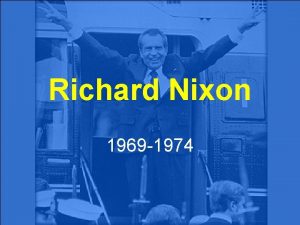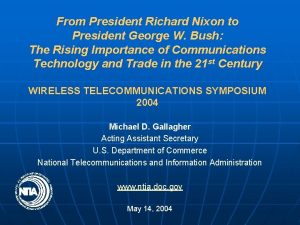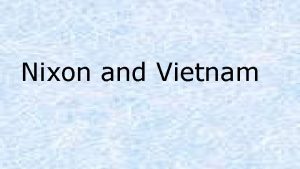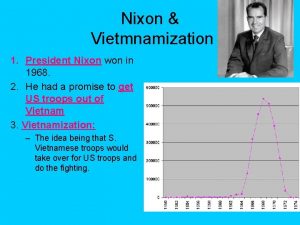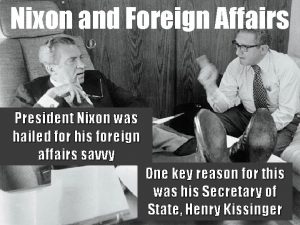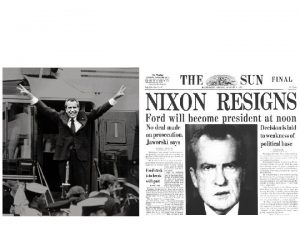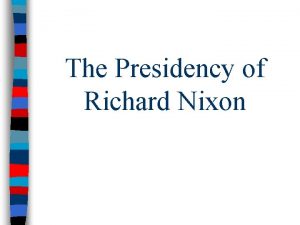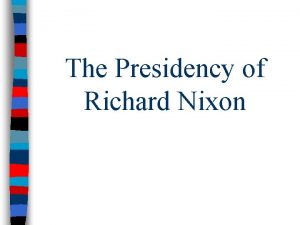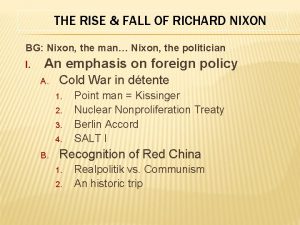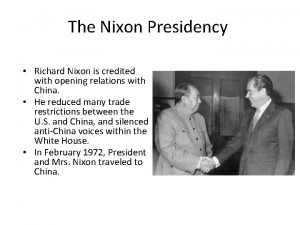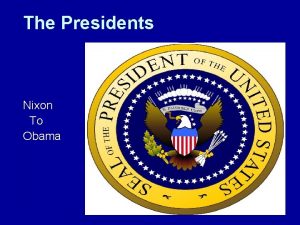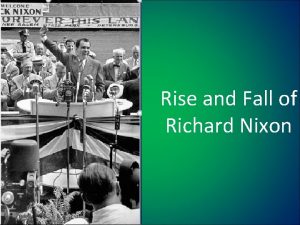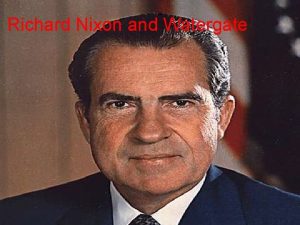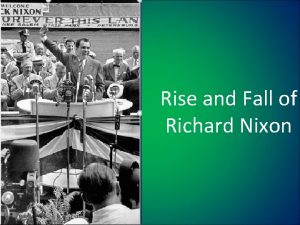President Richard Nixon President Richard Nixon US House




























































- Slides: 60

President Richard Nixon

President Richard Nixon • US House of Representatives 1947 -50 • US Senator 1950 -52 • US Vice President for Dwight D. Eisenhower 1952 -1960 • Defeated in his election bid for president by JFK 1960 (His VP running mate was Senator Henry Cabot Lodge)

Nixon and LBJ meet @ Whitehouse – July 1968

President Richard Nixon • 37 th President of the US • 1968 - Defeated LBJ’s vice president Hubert Humphrey and independent candidate Alabama Governor George Wallace by appealing to the “silent majority” to vote for him. • He promised “peace with honor” in his plan to end the Vietnam War • VP Maryland Governor Spiro Agnew


Nixon and Vietnam • 1969 Nixon visits South Vietnam and implements a strategy of “Vietnamization” where he replaces American troops with Vietnamese troops. • Nixon increased bombing and called for invasions into Cambodia and Laos • Continued troop withdrawals ended American involvement in Vietnam War • 1973 conscription (draft) ended • A brief truce between N and S Vietnam, fighting broke out again and North Vietnam defeated South Vietnam in 1975


Nixon and China Nixon and Chinese Premier Zhou Enlai – 1972

Nixon and China • In Nixon’s inaugural address he said: “the greatest honor history can bestow is the title of peacemaker” • 1972 Nixon visits China in an effort to improve relations. • Took over 100 TV reporters with him to capture the visit. America gets firs glimpse of Chinese life as they followed Pat Nixon around Beijing • This visit ushered in a new era of Chinese. American relations

Nixon and détente • Because of Nixon’s meeting with China, USSR feared an American-Chinese Alliance • 1972 after Nixon’s visit to China he flew to USSR and met with Brezhnev • They agreed to increase trade and…. • SALT I – the first comprehensive limitation pact which led to the • Anti-Ballistic Missile Treaty – banned development of systems designed to intercept incoming missiles • Nixon and Brezhnev proclaimed a new era of “peaceful coexistence” • détente – a “thawing out” period in the Cold War

US Involvement in Middle East • Nixon greatly increased arms sales to Middle East – Israel, Iran and Saudi Arabia • 1973 Egypt and Syria attacked Israel – Yom Kippur War • Nixon refused intervention requested by Egypt • USSR Brezhnev threatened to intervene and Nixon ordered DEFCON 3 – the closest to a nuclear war since Cuban Missile Crisis • USSR backs down • Arab OPEC nations retaliated by refusing to sell crude oil to US – 1973 Oil Crisis • After war US and Egypt reestablished relations


Nixon at home • Eliminates the Cabinet position of United States Post Office Department and established the USPS • Established the first “Earth Day” in 1970 • Formed the Environmental Protection Agency – EPA – 1970 • Nixon called for a “War on Drugs” pledging to cut off sources of supply abroad

Endangered Species Act • Signed into law by President Richard Nixon Dec 28, 1973 • Designed to protect critically imperiled species from extinction as a consequence of economic growth and development untempered by adequate concern and conservation. The Act is administered by two federal agencies, the US Fish and Wildlife Service (FWS) and the National Oceanic and Atmospheric Administration.

Endangered Species Act

Nixon and Space • 1969 US wins the race to land astronauts on the moon with the flight of Apollo 11. • Nixon spoke with Neil Armstrong and Buzz Aldrin during their moonwalk – “the most historic phone call ever made from the White House. ” • However Nixon reduced funding for NASA • and rejected plan for permanent base on the Moon


Nixon’s Phone Call to the Moon • http: //www. youtube. com/watch? v=Olj. SRj. B q. Qk 4&list=PL 9 F 719218 C 7 A 9 D 8 AE

Watergate • June 17, 1972 - 5 men caught breaking into Democratic party headquarters at the Watergate complex in Washington DC • Nixon downplayed scandal as mere politics • November 1972 – Nixon defeats George Mc. Govern with over 60% of popular vote in one of the largest landslide election victories in American history.

Watergate • July 1973 – White House Aid testifies that Nixon has a secret taping system that recorded his conversations and phone calls in the Oval Office. • Nixon provided transcripts of the conversations but not the actual tapes citing executive privilege. • Nixon’s lawyers reveal an 18 ½ minute “gap” of recorded conversation, blamed on Nixon’s secretary. • Nixon insisted that he had made mistakes but had no prior knowledge of the burglary, nor did he break any laws or learn of the “cover up” until early 1973. • October 1973 – VP Spiro Agnew resigns from Vice Presidency unrelated to Watergate – convicted on charges of bribery, tax evasion and money laundering while he was governor. • Minority Leader of House Gerald Ford replaces Agnew as VP

Watergate • May 1974 – impeachment hearings against Nixon open. • SC rules that all tapes must be released. • One tape reveals that Nixon had been told of the White House connection to the Watergate burglaries and his attempt to thwart the investigation. • Nixon told he would not be able to avoid impeachment and resigns on August 9, 1974 • He stated that he was resigning for the “good of the country” and asked the country to support the new president Gerald Ford

Watergate • September 1974 – President Ford issues a “full, free, and absolute pardon” to Nixon • Nixon releases the following statement: “I was wrong in not acting more decisively and more forthrightly in dealing with Watergate, particularly when it reached the stage of judicial proceedings and grew from a political scandal into a national tragedy. No words can describe the depth of my regret and pain at the anguish my mistakes over Watergate have caused the nation and the presidency, a nation I so deeply love, and an institution I so greatly respect. ”




Watergate Summary Video • http: //www. youtube. com/watch? v=at. URm 3 He 7 KM

President Gerald Ford

President Gerald Ford • The only person to assume the presidency without having been previously voted into either the presidential or vice presidential office. • On August 20, Ford nominated former New York Governor Nelson Rockefeller to fill the vice presidency that he had vacated. Nelson Rockefeller to fill the vice presidency he had vacated. • Historians believe the controversy was one of the major reasons Ford lost the election in 1976 • When he announced the Nixon pardon, Ford also introduced a conditional amnesty program for Vietnam War draft dodgers who had fled to countries such as Canada

Domestic Affairs • 1 month into presidency, Ford pardoned Nixon, which greatly damaged Ford’s approval rating. • 1975 economy worst since Grt. Dep. • Unemployment – 9% • Started a voluntary plan called WIN, ‘Whip Inflation Now’ – Americans should cut back on oil/gas consumption – failed. • Cut govt. spending and incr. interest rates to curb inflation – failed.

Foreign Affairs • Kept Kissinger – Sec. of State • Continued to pursue Détente • 1975 met with leaders of NATO and Warsaw Pact to sign the Helsinki Accords – recognized the borders of Eastern Europe established at end of WWII. • In return, the Soviets promised to uphold certain basic human rights, including the right to move across national borders for their citizens.

President Jimmy Carter

Jimmy Carter • Georgia Governor 1970 -74 (replaced Lestor Maddox) • Walter Mondale VP running mate • Defeated Ford in a very narrow race • 39 th President of the US 1976 -80 • Created two new cabinet-level departments: the Department of Energy and the Department of Education

Camp David Accords • Peace Treaty signed by Egyptian President Anwar El Sadat and Israeli Prime Minister Menachem Begin on September 17, 1978, following thirteen days of secret negotiations at Camp David with President Carter. • Mostly dealt with Palestinian territory in Israel, but agreement did not involve the Palestinian’s input and had little impact

Iran Hostage Crisis • A diplomatic crisis between Iran and the United States. Fiftytwo American diplomats and citizens were held hostage for 444 days (November 4, 1979, - January 20, 1981) • Group of Iranian students supporting the Iranian Revolution took over the US Embassy in Tehran. • President Carter called the hostages "victims of terrorism and anarchy, " adding that "the United States will not yield to blackmail. ” • The hostage taking was widely seen as a blow against the US and its influence in Iran, its perceived attempts to undermine the Iranian Revolution, and its longstanding support of the recently overthrown Shah of Iran

Iran Hostage Crisis • After failed attempts to negotiate a release, the United States military attempted a rescue operation off ships that were patrolling the waters near Iran. • April 24, 1980, “Operation Eagle Claw” resulted in a failed mission, the deaths of eight American servicemen, one Iranian civilian, and the destruction of two aircraft

Iran Hostage Crisis

Iran Hostage Crisis

Iran Hostage Crisis

Iran Hostage Crisis

Iran Hostage Crisis

Iran Hostage Crisis

Iran Hostage Crisis

Iran Hostage Crisis

Iran Hostage video • http: //www. youtube. com/watch? v=DHB_h RYy. TQg

Iran Hostage Crisis

Iran Hostage Release

Iran Hostage Return

Community Reinvestment Act • A US federal law designed to encourage commercial banks and savings associations to help meet the needs of borrowers in all segments of their communities, including low- and moderateincome neighborhoods. • Congress passed the Act in 1977 to reduce discriminatory credit practices against low-income neighborhoods, a practice known as redlining

Development of Computers • The. Intel 4004 chip, developed in 1971, took the integrated circuit one step further by locating all the components of a computer (central processing unit, memory, and input and output controls) on a minuscule chip. • One microprocessor could be manufactured and then programmed to meet any number of demands. Soon everyday household items such as microwave ovens, television sets and automobiles with electronic fuel injection incorporated microprocessors • By the mid-1970's, computer manufacturers sought to bring computers to general consumers. These minicomputers came complete with user-friendly software packages that offered even non-technical users an array of applications, most popularly word processing and spreadsheet programs


Development of Computers • In the early 1980's, arcade video games such as Pac Man and home video game systems such as the Atari 2600 ignited consumer interest for more sophisticated, programmable home computers. • By 1992 65 million PCs were being used • In direct competition with IBM's PC was Apple's Macintosh line, introduced in 1984. Notable for its user-friendly design, the Macintosh offered an operating system that allowed users to move screen icons instead of typing instructions. Users controlled the screen cursor using a mouse, a device that mimicked the movement of one's hand on the computer screen.


Atari 1971


Bill Gates • Gates is one of the best-known entrepreneurs of the personal computer revolution. • Gates is the former chief executive and chairman of Microsoft, the world’s largest personalcomputer software company, which he cofounded with Paul Allen. • During his career at Microsoft, Gates held the positions of CEO and chief software architect, and remains the largest individual shareholder, with 6. 4 percent of the common stock.

Bill Gates

Robotics in the Workplace • http: //www. youtube. com/watch? v=mb. Hy 7 TZ 06_s

Billy Graham • American evangelical Christian evangelist who held large indoor and outdoor rallies; sermons were broadcast on radio and television, some still being re-broadcast today. • Graham was a spiritual adviser to several Presidents; he was particularly close to Dwight D. Eisenhower, Lyndon Johnson (who was considered to be one of Graham's closest friends) and Richard Nixon. • During the civil rights movement, he began to support integrated seating for his revivals and crusades; in 1957 he invited Martin Luther King, Jr. to preach jointly at a revival in New York City. Graham bailed King out of jail in the 1960 s when he was arrested in demonstrations. • According to his staff, more than 3. 2 million people have responded to the invitation at Billy Graham Crusades to "accept Jesus Christ as their personal savior". As of 2008, Graham's estimated lifetime audience, including radio and television broadcasts, topped 2. 2 billion


 President nixon endorsed vietnamization because
President nixon endorsed vietnamization because Richard nixon
Richard nixon Tricky dicky richard nixon
Tricky dicky richard nixon Nixon leaving white house
Nixon leaving white house Ducks unlimited president
Ducks unlimited president Richard iii and looking for richard
Richard iii and looking for richard Rhyme time house of games examples
Rhyme time house of games examples My house shall be called a house of prayer
My house shall be called a house of prayer What is an acceptance house
What is an acceptance house They went house to house
They went house to house Snug bugs home
Snug bugs home Helel keller
Helel keller Banished boarding house
Banished boarding house Jerry nixon microsoft
Jerry nixon microsoft United states v nixon outcome
United states v nixon outcome Nixon china
Nixon china Vanderbilt university isfaa
Vanderbilt university isfaa Nixon tally stick download
Nixon tally stick download Nixon ford carter reagan
Nixon ford carter reagan Dr jon nixon
Dr jon nixon Chapter 32 section 1 the nixon administration
Chapter 32 section 1 the nixon administration Chapter 24 section 1 the nixon administration answers
Chapter 24 section 1 the nixon administration answers David milder
David milder Chapter 24 section 1 the nixon administration
Chapter 24 section 1 the nixon administration Ascites precox causes
Ascites precox causes Chapter 32 section 1 the nixon administration
Chapter 32 section 1 the nixon administration Regents of university of california v bakke
Regents of university of california v bakke 882
882 Nixon peabody boston
Nixon peabody boston Vicki nixon
Vicki nixon Gardner's line spleen
Gardner's line spleen Objetivo holistico ejemplos
Objetivo holistico ejemplos Nixon quaker religion
Nixon quaker religion Vice president training
Vice president training Chapter 14 the presidency in action answer key
Chapter 14 the presidency in action answer key Which officer presides over and conducts meetings in fbla
Which officer presides over and conducts meetings in fbla Chapter 9 the federalist era
Chapter 9 the federalist era Vice president training
Vice president training Why did president wilson propose his fourteen points
Why did president wilson propose his fourteen points In 1802 president
In 1802 president Executive office of the president
Executive office of the president Rawan plushie
Rawan plushie Cuanto gana equipo presidente herbalife
Cuanto gana equipo presidente herbalife President's management council interagency rotation program
President's management council interagency rotation program Vice president of club duties
Vice president of club duties President's advisory council on financial capability
President's advisory council on financial capability 44th president
44th president Grace for president
Grace for president President taft’s foreign policy emphasized
President taft’s foreign policy emphasized Vpm membership
Vpm membership 7 th president
7 th president Hoover's response to the depression
Hoover's response to the depression Informal powers of the president
Informal powers of the president What ffa officer is stationed by the flag
What ffa officer is stationed by the flag The many roles of the president
The many roles of the president Thomas jeffersons presidency
Thomas jeffersons presidency Roles of the president
Roles of the president President of dallas theological seminary
President of dallas theological seminary Which president completed manifest destiny
Which president completed manifest destiny Informal qualifications for president
Informal qualifications for president Congress informal powers
Congress informal powers
